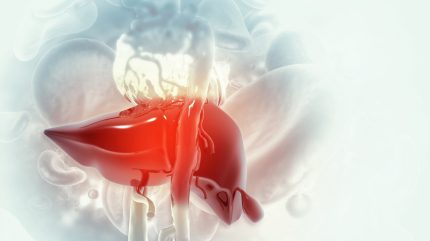
Boehringer Ingelheim and Zealand Pharma’s GLP-1/glucagon receptor dual agonist survodutide has significantly improved liver fibrosis in patients with metabolic dysfunction-associated steatohepatitis (MASH).
Data from the Phase II trial (NCT04771273) sub-analysis demonstrated that patients treated with survodutide showed an improvement in their disease status. For example, 52.3% of patients with mild to moderate or advanced fibrosis showed an improvement, compared to only 25.8% in the placebo group after 48 weeks of treatment. Additionally, 64.5% of patients with moderate or advanced fibrosis saw an improvement in liver scarring-related measures without worsening of MASH, compared to 25.9% of those in the placebo group.

Discover B2B Marketing That Performs
Combine business intelligence and editorial excellence to reach engaged professionals across 36 leading media platforms.
Data from this trial has been highly anticipated following an initial announcement readout in February 2024, when the companies said that the trial had met its primary endpoint. These results showed that 83% of adults achieved a statistically significant improvement of MASH versus 18.2% on placebo. The detailed data was published in the New England Journal of Medicine and presented at the ongoing European Association for the Study of the Liver Congress (EASL) 2024 meeting.
The MASH race is heating up, with Boehringer and Zealand in close competition with Eli Lilly – which revealed that its blockbuster GLP-1/GIP dual receptor agonist Mounjaro (tirzepatide) can also significantly impact fibrosis in MASH patients (NCT04166773), in an 8 June announcement. The drug reduced fibrosis by at least one stage in 51.8% of patients after 52 weeks of treatment at a 5mg dose, compared to 13.2% of patients on placebo.
Discovered and developed by Zealand, survodutide is a dual agonist of the GLP-1 and glucagon receptors. Boehringer is also studying survodutide in obesity, advancing the candidate into three Phase III trials in August 2023 following positive data from previous studies. Survodutide is licensed to Boehringer from Zealand.
Companies that develop and manufacture GLP-1 RAs have been assessing market opportunities beyond weight loss and diabetes, with MASH emerging as a promising indication. While data from Boehringer and Zealand has shown impressive results, Novo Nordisk’s semaglutide failed to meet its primary endpoint of improving NASH-related cirrhosis compared to placebo, in a Phase II clinical trial (NCT03987451). Following an update in scientific community, on-alcoholic steatohepatitis (NASH) is now described as MASH.

US Tariffs are shifting - will you react or anticipate?
Don’t let policy changes catch you off guard. Stay proactive with real-time data and expert analysis.
By GlobalDataMASH is a form of non-alcoholic fatty liver disease characterised by inflammation and liver cell damage, often associated with the accumulation of fat in the liver. Boehringer also has its eyes on MASH treatments outside of GLP1-RAs, having entered into a $2bn deal with Suzhou Ribo Life Science and Ribocure Pharmaceuticals (Ribo) in January 2024, to develop small interfering RNA (siRNA)-based treatments.
In the announcement accompanying the data, Boehringer’s Head of Human Pharma Carinne Brouillon said: “Today’s breakthrough fibrosis results further reinforce survodutide’s potential as a best-in-class treatment for people living with MASH. We will advance quickly into Phase III trials.”


